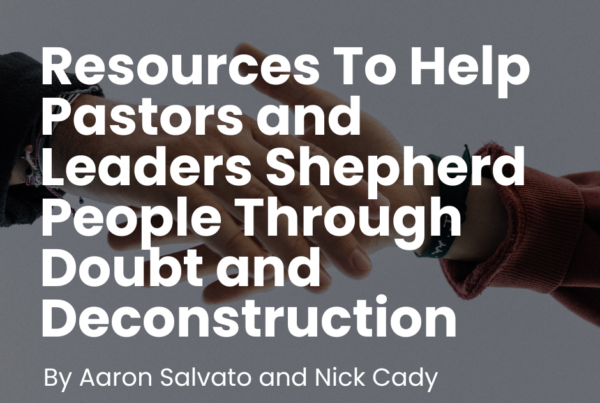
Originally published on March 1, 2016
I’m not a huge pastry fan, but I do enjoy a fresh, hot slice of apple pie with a generous scoop of rich vanilla ice cream.
The rich, creamy ice cream, luxuriously melting over the warm, flaky, buttery crust is pretty much irresistible. Pie a la Mode was invented about 1885.
Fruit pies were common in the Roman Empire as early as the 5th Century B.C., and ice cream was available to the general public by 1660. Yet, the world would wait more than 200 years before ice cream and pie were combined to offer something wonderful—pie a la Mode. The moral of the story is that sometimes “both and” is better than “either or.”
What Is the “both and” of making disciples?
We need to be both filled with the Spirit and intentional in making disciples. Some might assert that not being intentional is organic, thus led by the Spirit. But that’s not necessarily the case. Similarly, one could argue that if a process is intentional (strategic), it’s of man (flesh) and not of the Spirit.
But again, a review of the Scripture reveals that the claimed divide between organic and strategic is a false dichotomy. In fact, a review of Paul’s ministry at Ephesus demonstrates the “both and” principle (Acts 19:1-7; Eph. 5:18).
Have you ever met people who claimed to be followers of Jesus, but there just seemed to be something missing that made you wonder if they were really submitted to Him? When Paul returned to Ephesus, he found some disciples and asked the curious question “Did you receive the Holy Spirit when you believed?” On no other occasion do we have a record of Paul making this inquiry. What prompted him to ask?
Presumably, there appeared to be something missing in their spiritual lives that prompted the question. Perhaps they didn’t seem to be submitted to Christ as Lord, or empowered by the Spirit for Christian living, or perhaps Paul had some discernment about what was lacking. These disciples at Ephesus confessed their ignorance of the Holy Spirit (verse 2).
Yet, the text indicates they were disciples and implies they were believers. They understood the need for repentance and desired to follow Jesus (verse 4). But they were apparently seeking to become mature followers of Christ by either the power of self-discipline or man’s efforts rather than the power of God’s Spirit.
And Paul recognized the problem. Subsequently, the Holy Spirit came upon them and was manifest (verse 6).
Jesus declared that His followers would receive power to represent Him when the Holy Spirit came upon them (Acts 1:8). He likened it to being baptized with the Holy Spirit or being filled with the Holy Spirit (Acts 1:5, 2:4).
We believe that the baptism, or filling of the Spirit, is distinct from salvation, but it may occur at the same time or subsequent to being saved. The work of the Holy Spirit empowers Christian living. Jesus affirmed that the Holy Spirit was available to those who sought this gift from God and were yielded to Him (Luke 11:9-13).
When Paul wrote to the Ephesians, he instructed them as follows: “Be filled with the Spirit” (Eph. 5:18).
The Greek reveals that it’s a commandment, and the tense can be translated “Being constantly filled with the Spirit.” The terminology of being filled might cause some to assume that we can leak the Holy Spirit, like a car engine can leak a quart of oil. Or we might think that the issue is how much of the Holy Spirit a believer has. Nevertheless, the issue isn’t how much of the Holy Spirit we have, but how much of us the Holy Spirit has.
Being filled with the Holy Spirit flows from being submitted to Jesus. We need to be filled with the Holy Spirit in order to be disciples and to make disciples.
Once the believers at Ephesus were filled with the Holy Spirit, Paul began an intentional process of mentoring them to become mature followers of Christ (Acts 19:8-10). Paul taught the Scriptures daily to make disciples and develop leaders at Ephesus.
The Bible helps us to understand God and know His commandments. Thus, Bible learning is critical to being a disciple. For example, it is through the Scriptures generally, and Ephesians specifically, that we learn how being filled with the Spirit is manifest in praise, gratitude, mutual respect, marriage, family, and the workplace (Eph. 5:17-6:9).
But having knowledge, apart from the power of the Spirit, to apply the lessons is futile. So, making disciples requires us to be both filled with the Spirit and intentional (“both and”).
The filling of the Spirit is so critical to disciple-making that Paul issued a sober warning: “And don’t be drunk with wine in which is dissipation; but be filled with the Spirit …” (Eph. 5:18). Please pardon the pun about “sober” warning, for the issue is not limited to excessive alcohol consumption. Paul’s exhortation is connected to the earlier cautions to live carefully in wisdom, redeem the time, and understand and do the will of God (Eph. 5:15-17).
Excessive alcohol consumption is an obstacle to being controlled by God, and is sin. And Paul notes that being drunk is dissipation. Dissipation relates to squandering energy, time, money, or other resources.
The only way to avoid wasting resources and wasting a life is to be intentional to live as Christ’s disciples, disciples who make disciples. And the only way to be a disciple is to be controlled by God or filled with the Spirit.
Thus, the moral of this story is that sometimes “both and” is better than “either or.”
Lifework
1. How can disciples neglect the need for the filling of the Spirit?
2. Why is it helpful to have an intentional process, along with the filling of the Spirit, to help become a disciple?
3. How do you believe that being filled with the Spirit and intentionally going through the discipleship process would help you in making disciples?










